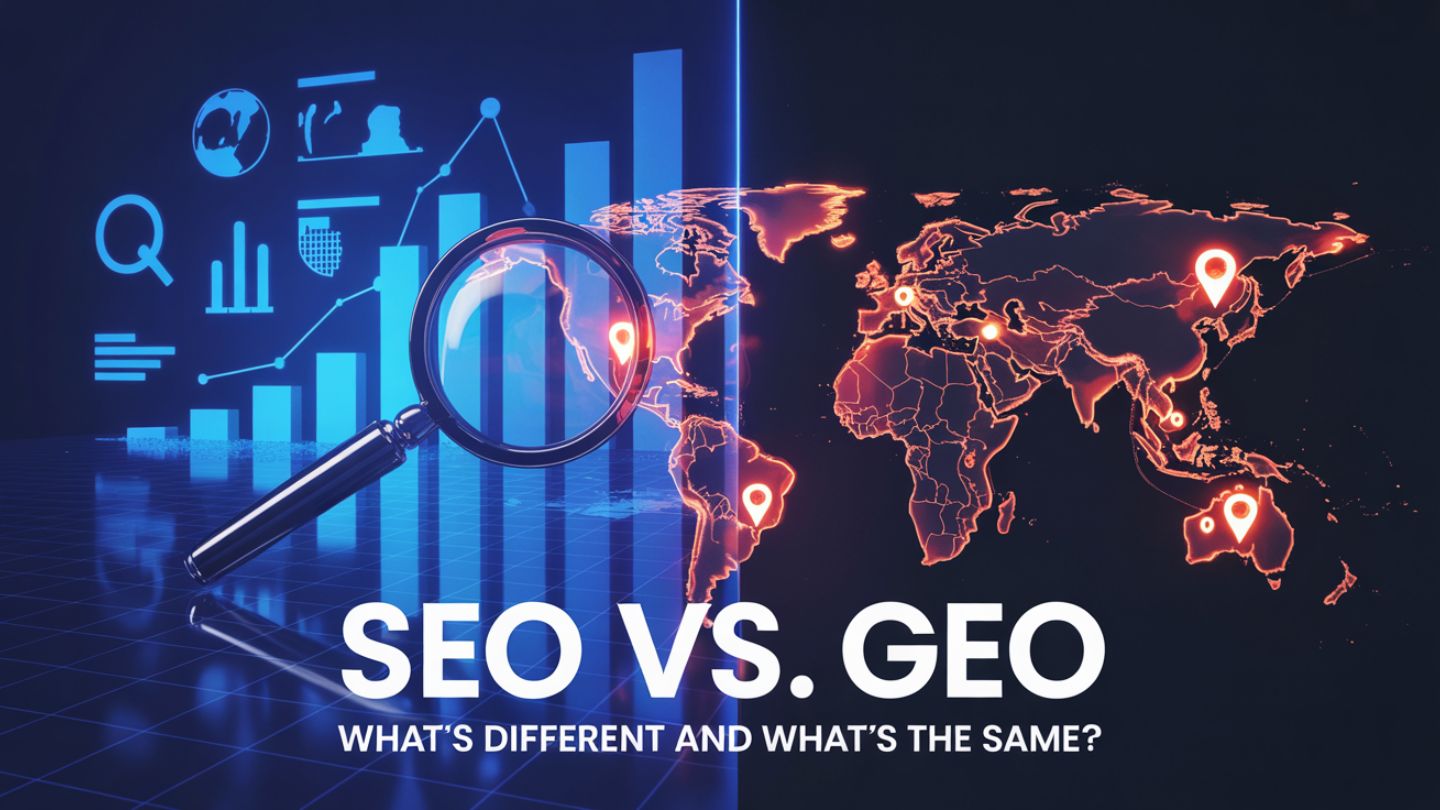
In today’s rapidly evolving digital landscape, the terms Search Engine Optimization (SEO) and Generative Engine Optimization (GEO) have become more relevant than ever. While they may sound similar, each serves a distinct purpose—and when used together, they can profoundly amplify your brand’s visibility. This article will explain what SEO and GEO are, how they differ, what they share in common, and how you can leverage both to best effect.
What Are SEO and GEO?
SEO (Search Engine Optimization):
SEO is the foundational digital marketing practice of optimizing a website so that it appears prominently in traditional search engine results (e.g., Google Search, Bing). The goal is to earn higher rankings on search engine results pages (SERPs) so you can attract organic traffic. Core aspects of SEO include keyword research, backlink building, quality content creation, technical optimization, mobile friendliness, site speed, and so on.
GEO (Generative Engine Optimization):
GEO is a newer strategy designed to optimize content so that it is recognized, cited, and used by AI-driven systems (such as ChatGPT, Perplexity, or Google’s AI Overviews). Rather than simply trying to rank a page, GEO focuses on being included in the answers those systems give, meaning your content becomes part of the AI’s knowledge graph or response engine.
Read more: Why Your Website Needs a Generative Engine Optimization (GEO) Audit
Key Differences Between SEO and GEO

Here are some of the primary ways SEO and GEO diverge:
Primary Goal:
- SEO aims to rank a website page within search engine results for user queries.
- GEO aims to have your content cited or used by AI response systems—regardless of whether the user clicks through to your page.
Target Platforms:
- SEO targets traditional search engines (Google, Bing, Yahoo).
- GEO targets AI engines: generative models and answer engines like ChatGPT, Gemini, Perplexity, and Google’s Search Generative Experience.
Ranking Signals / Optimization Focus:
- SEO: Keywords, backlinks, technical site factors, content length, and user experience.
- GEO: Structured content, entity clarity, clear answers, trustworthiness, citation-worthiness for AI.
Content Structure & User Behavior:
- SEO: Often long-form articles, optimized for clicks, dwell time, and SERP placement.
- GEO: Often clear headings, direct answer-first structure, easy for an AI to extract, possibly fewer clicks (as the AI may answer directly).
Traffic vs Citation:
- SEO: Focuses on generating organic traffic.
- GEO: Focuses on generating mentions, citations, and brand presence within AI responses—even if no click-through occurs.
What They Share in Common
Despite their differences, there are significant similarities between SEO and GEO—meaning you don’t have to treat them as entirely separate silos.
- Quality Content Is Key: Whether you’re optimizing for a search engine or an AI assistant, high-quality, expert, user-helpful content wins. Depth, accuracy, and relevance benefit both strategies.
- Authority and Trust: Signals like expertise, experience, authoritativeness, and trust (often referenced as E-E-A-T) matter for SEO rankings and also for GEO inclusion.
- Structured Organization: Clear headings, lists, FAQ sections, and structured data help both search engines and AI systems understand and use your content.
- Technical Foundations Matter: Crawling, indexing, site speed, and mobile usability all contribute to traditional SEO and ensure that your content is accessible for AI engines to use.
In short, while the “why” and the “how” differ, the underlying principle—helping users by providing valuable content—remains the same for SEO and GEO.
Why Both SEO and GEO Matter Together
Ignoring one in favor of the other could be risky. Here’s why integrating both is the smarter choice:
- SEO still drives the majority of web traffic via traditional searches. Without it, you may miss out on a large audience.
- GEO ensures you gain visibility in the future of discovery, such as AI assistants and generative answer systems, where users might bypass SERPs altogether.
- When both strategies are combined, you cover all bases: users who search conventionally and users who ask AI systems for answers.
- Many signals (authority, freshness, structure) enhance both SEO and GEO simultaneously, providing dual benefits.
In essence, it’s not a matter of SEO versus GEO—it’s SEO plus GEO.
How to Integrate SEO + GEO in Practice

Here are actionable guidelines to unify both approaches:
- Audit existing high-performing pages: Take your best SEO pages and enhance them with explicit entity definitions, FAQ sections, more transparent structure and answer-first layouts to make them GEO-ready.
- Optimize for natural language queries: While keywords still matter, GEO increasingly responds to conversational queries (“What is the best X?”, “How do I…?”) that people ask AIs.
- Use structured markup and clear entities: Implement schema markup, define your brand/product clearly, signal relationships between topics—this helps AI systems understand and potentially cite your content.
- Front-load key facts: Begin your content with concise, authoritative statements. This helps win featured snippets and AI extraction.
- Track both metrics: Standard SEO metrics include rankings, organic visits, bounce rate; GEO metrics might include citations by AI systems, inclusions in answer engines, brand mention in generative responses.
- Keep content fresh and authoritative: Both search engines and AI systems favor up-to-date, expert-backed, trustworthy content.
Conclusion
SEO and GEO aren’t rivals—they’re complementary engines of visibility. SEO secures your presence on traditional SERPs with technical excellence, authority, and user-first content, while GEO extends that presence into AI-driven answer engines by emphasizing clear entities, structured information, and citation-worthiness. Together, they future-proof your discoverability: SEO captures intent-driven traffic today; GEO earns brand mentions and references inside generative responses tomorrow.
At The Ocean Marketing, our SEO Services integrate both disciplines—auditing your high-value pages, structuring content for natural-language queries, implementing schema, and front-loading authoritative answers—so you win in search results and inside AI answers alike. Contact us to align SEO + GEO into a single growth strategy that builds trust, expands reach, and drives measurable results.

Marcus D began his digital marketing career in 2009, specializing in SEO and online visibility. He has helped over 3,000 websites boost traffic and rankings through SEO, web design, content, and PPC strategies. At The Ocean Marketing, he continues to use his expertise to drive measurable growth for businesses.

